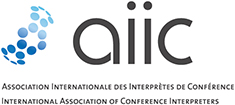Resources

Conference interpreting training programmes' best practices

AIIC's Survey of Interpreting Schools and Programs is open to all (excluding commercial) interpreting schools and programs that meet AIIC's Best Practice criteria.
Information submitted by interpreting Schools and Programmes will be published as part of AIIC's Schools Directory if the following criteria are met. Publication does not constitute a recommendation by AIIC.
1. Eliminatory Criteria
1.1 The course is only open to post-graduate students.
1.2 Aptitude test before course begins (one year) or at an early stage in the course for longer courses.
1.3 The course is taught by conference interpreters.
1.4 The curriculum must include instruction in both consecutive and simultaneous interpretation.
1.5 Course must be at least 2 semesters (1 academic year) long.
1.6 The course must have already run for one academic year.
1.7 Interpreting Schools/university courses may not benefit financially from assignments worked by their students.
Users are then invited to compare this and the additional published information for each School or Programme with the following Best Practice recommendations drawn up by AIIC.
2. Before the course
2.1 Programmes at post-graduate level are more appropriate to train conference interpreters for entry into the profession.
2.2 Applicants have to pass an aptitude test before being admitted to the school.
2.3 Applicants are encouraged to spend considerable time living and working or studying in a country where their non-native languages are spoken before they consider entering a professional training programme.
2.4 The school and teaching faculty inform candidates before and during their studies about relevant potential employment opportunities.
3. The course
3.1 The curriculum is posted online.
3.2 The language combinations offered as part of the regular curriculum reflect market requirements.
3.3 The curriculum includes a theory component and a course which addresses professional practice and ethics. These courses should be delivered by professional conference interpreters.
4. Trainers
4.1 Courses are designed and interpretation classes taught by professional conference interpreters whose language combinations are recognised by AIIC or by an international organisation.
4.2 Teachers of interpretation have had some teacher training specifically related to interpretation.
4.3 All programmes are delivered by a combination of native speakers of the students' A and B/C (native and non-native) languages.
5. Exams
5.1 The final diploma in Conference Interpretation is only awarded if the candidate's competence in both consecutive and simultaneous interpreting in all working language combinations has been assessed and judged consistent with professional entry requirements.
5.2 All tests are eliminatory at finals.
5.3 Final examinations are conducted in an open and transparent fashion. Candidates should understand the assessment criteria.
5.4 Final examination juries are composed of teachers from the academic programme and external assessors who are also professional conference interpreters. The latter's assessment of each examinee's performance should count towards the final mark awarded.
5.5 Representatives from international organisations and other bodies that recruit interpreters are invited to attend final exams as observers if they are not already present as external assessors.
5.6 Any Degree or Diploma awarded states the graduate's language combination, clearly indicating active and passive languages.
See also: Guidelines for Student Internships in Conference Interpreting
If you wish to contact AIIC about matters relating to Interpreting Schools or Best Practice please use this address: schools@aiic.org
Date Posted: November 01, 2023

